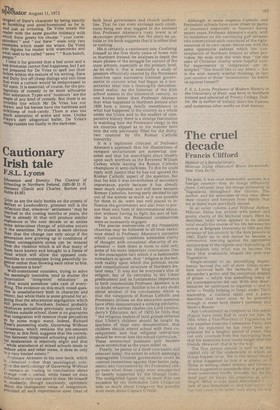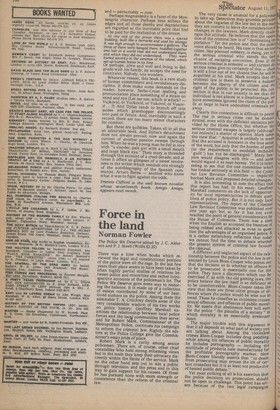The cruel decade Francis Clifford
Memoir of a Revolutionary Milovan Djilas (Harcourt Brace Jovanivich, New York £4.75) The past, it was once memorably averred, is a foreign country: they do things differently .there. Certainly they did things differently in Yugoslavia throughout the 'thirties. The author, and his associates of that time, drew their vitality and heroism from depths that we at home were mercifully denied.
In an caller volume, Land Without Justice, Milovan Djilas has written with power and poetic clarity of his boyhood years. Here he describes (with what appears to be almost total recall) the course of his life between his arrival at Belgrade University in 1929 and the invasion of his country by the Axis powers in 1941. Early on in this period he became a communist, reacting against the oppressive dictatorship of the regime and channelling all his idealism into what was to become the force that eventually shaped the post-war Yugoslavia.
Single-minded to an astonishing degree, heroic beyond the call of duty. Diilas somehow survived both the barbarity of King Alexander's police and the cancerous despair of prison — which was something many of his contemporaries did not. With iron determination he continued to organise — and to write — finally helping to forge, under Tito's leadership, a national spirit and a party machine that were soon to be powerful enough to resist both Hitler's Germany and Stalin's Russia.
Any commitment as complete as this seems chance have since had in store for him. In 1954, when a Vice-President of Yugoslavia, he was expelled from the Communist Party, and since his expulsion he has twice been imprisoned for a lenghty period of years. One can only conclude from this fascinating book that his memories have lasted longer than his friends. However, that is by the way. The first person sinular is said to be the capital city of the underworld in which all
things happen to us. Yet in this meaty record of what happened to him it is ahliOSS us if Djilas is writing about dramas and violence which happened to somebody else. -A grim humour sometimes briefly intrudes, hut for Hs, most part he keeps his ,emotions at art's length. What is even more remarkable . lack of any bitterness — anci God knoes has had cause to be bitter, both along the way
and — persumably — now. Perhaps magnanimity is a facet of the Montengrin character. Perhaps time softens the edges and all those deaths and degradations are regarded as the inevitable price that had to be paid for the realisation of the dream.
At one end of the prison there was G special building, built like a barracks and used for storage. It was high enough to accommodate a gallows. The three of them were hanged there, huddled together and lost in a world that did not understand them, and which they did not understand. They were buried secretly in the swamps of the island, which eat up human bones in no time, .
Or perhaps, alive and well and living in Belgrade with his family, he accepts the need for constraint. Naively, one wonders.
Whatever reason, this book is a rare study of human commitment and revolutionary discipline. It does make some demands on the reader, however. Serbo-Croat spelling and pronunciation place something of a strain on mind and eye (Let me see; which is which? — Vujkovid, or Vuckovid, or Vukovi& or Vusovi6 ...?) And Djilas tends to branch off into asides which grasshopper disconcertingly into past or future. And, inevitably in such a record, there are too many minor characters for comfort.
But these are quibbles, Taken all in all this an admirable book. And Djilas's detachment does not always prevail; now and again the current of another passion sweeps through him. When he was a young man he fell in love with "a slender, pale girl with a small mouth and large black eye." Their story is threaded through this account of a cruel decade, and at times it offers us glimpses of a sweet tendreness in the writer which reminds one strongly of the autobiography of the Spanish communist, Arturo Barea — another who knew what it was to fight against the odds.
Francis. Clifford is the well known novelist whose seventeenth book, Amigo Amigo, appears next month.



































 Previous page
Previous page